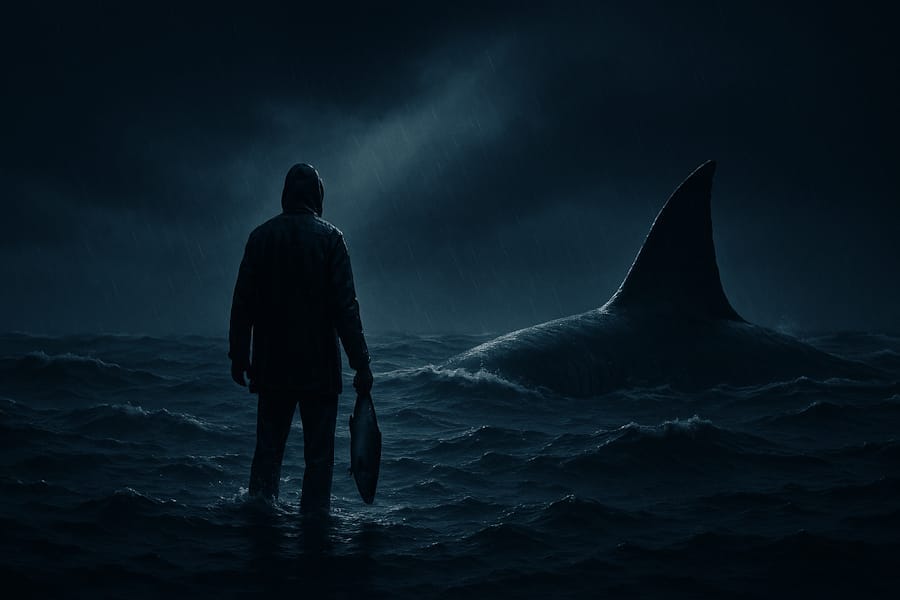Type: Article -> Category: Smoke & Mirrors

Using a Dead Fish to Take on a Shark - The Illusion of UK Drug Policy
Part of the “Smoke & Mirrors” Life Series
Publish Date: Last Updated: 17th February 2026
Author: nick smith- With the help of CHATGPT
In the theatre of modern politics, illusion is everything. This week, buried deep in the back pages of the mainstream press, a quiet story slipped past most eyes, but it speaks volumes about the times we live in.
The British Government has reportedly withdrawn certain intelligence data on the movements of high-speed boats used by international drug smugglers. The reason? To protect the human rights of the smugglers themselves.
When you are surrounded by sharks in open water, the last thing on your mind is the shark’s right to a fair meal. Waving a dead fish at them doesn’t promote peace, it just whets their appetite.
The Illusion of Compassion
✅ Key Statistics
- According to the United Nations Office on Drugs and Crime (UNODC) 2024 report, the global drug-supply and demand system remains at “record supply and demand” levels, driven by synthetic drugs and increasing production.
- In England & Wales for the year ending March 2024: Approx 8.8 % of people aged 16-59 (around 2.9 m) reported using any illicit drug in the past 12 months.
- In England & Wales in the year ending March 2023, there were 191,623 drug seizures by police and Border Force.
- The UK government has allocated £903 million additional funding over 2022-23 to 2024-25 for its drug strategy, which includes £105 million to disrupt supply, £768 million for treatment/recovery, and £30 million for reducing demand.
Our current leadership, shaped by a background in human rights law, continues to prioritize the appearance of moral virtue over the reality of public safety. It’s the perfect example of the illusion we now inhabit, one where protecting those who prey on society somehow takes precedence over protecting society itself.
Drug cartels are not misunderstood entrepreneurs. They are violent, organized empires that thrive on human misery. They do not acknowledge human rights, their justice is measured in bullets and fear.
Globally, the illegal drug trade is estimated to be worth over $300 billion annually, costing hundreds of thousands of lives each year through overdoses, gang violence, and exploitation. In Mexico alone, over 30,000 people are murdered annually, many linked directly to the narcotics trade. These are not statistics that invite negotiation or tolerance.
Force vs. Fantasy
History has repeatedly shown that monsters built on violence cannot be reasoned with. They can only be confronted with strength. This doesn’t mean indiscriminate brutality, it means decisive policy, clarity of purpose, and the courage to act when it’s uncomfortable.
U.S. President Donald Trump’s hardline stance on drug cartels, including treating major traffickers as foreign terrorist organizations, reflects an uncomfortable truth: diplomacy has its limits. His approach may be controversial, but it sends a message that resonates, actions have consequences.
In contrast, the UK’s decision to restrict intelligence sharing on smuggling routes sends the opposite signal. Why spend billions policing a problem while shielding its perpetrators? If the moral argument is so fragile that we cannot even share data to stop criminals, perhaps we should admit defeat, legalize it, tax it, and accept the social fallout. Anything else is hypocrisy dressed as compassion.
The Wider Consequences
This isn’t just about drugs. It’s about the erosion of trust between allies. The UK’s intelligence community relies heavily on data and insights from the United States and Israel, nations with vast counterterrorism and organized crime networks.
Yet, over the past 18 months, relations have cooled. Despite the smiles and photo ops, political leaders in London and Washington are ideologically worlds apart. Meanwhile, controversy around British media institutions, such as the BBC’s alleged manipulation of footage involving Donald Trump, has only added to the perception that the UK is drifting from its traditional allies.
If that trust fractures, the repercussions could be severe. Much of the intelligence that has prevented terrorist attacks in the UK originates from U.S. or Israeli sources. Undermining those relationships for the sake of symbolic gestures about “human rights” is not noble, it’s reckless.
The Smoke and Mirrors of Policy
We are watching a contradiction play out in real time: billions spent fighting the drug war, while the very people fueling it are granted legal and moral shelter. It’s a political illusion that comforts the idealists while emboldening the ruthless.
In a game without rules, you cannot win by playing fair. Sometimes leadership means making decisions you don’t like, decisions that protect the majority, not appease the minority causing the harm.
Until our leaders rediscover that principle, the sharks will keep circling. And the only thing we’ll be left waving, is a dead fish.
Latest Smoke & Mirrors Articles
AI Questions and Answers section for Using a Dead Fish to Take on a Shark - The Illusion of UK Drug Policy
Welcome to a new feature where you can interact with our AI called Jeannie. You can ask her anything relating to this article. If this feature is available, you should see a small genie lamp above this text. Click on the lamp to start a chat or view the following questions that Jeannie has answered relating to Using a Dead Fish to Take on a Shark - The Illusion of UK Drug Policy.
Be the first to ask our Jeannie AI a question about this article
Look for the gold latern at the bottom right of your screen and click on it to enable Jeannie AI Chat.
Type: Article -> Category: Smoke & Mirrors






